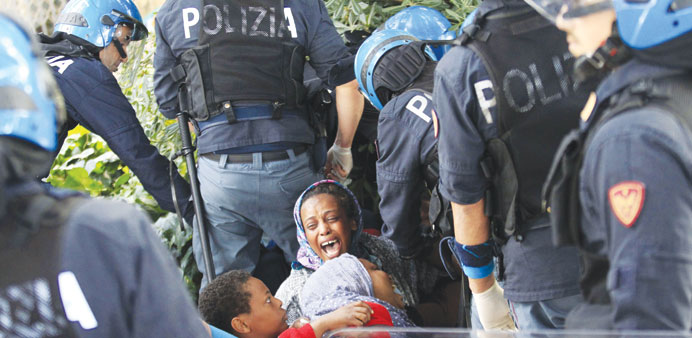Italian police officers surround a family of migrants during an operation to remove them from the Italian-French border in Ventimiglia.
DPA/AFP/Reuters
Ventimiglia, Italy
Italian police have forcefully evacuated dozens of mainly African migrants from their shelter under a railway bridge on the Franco-Italian border, which has become a flashpoint in Europe’s immigrant crisis.
Italian police dressed in riot gear removed dozens of migrants, including crying women.
Around 300 of them have gathered near the town of Ventimiglia over the past five days.
Some of the mostly Sudanese, Eritrean and Somali migrants tried to resist by locking arms and lying on the ground.
Many have been repeatedly rebuffed by France, which says they are Italy’s responsibility.
After police took away one busload of people, about 60 migrants stayed behind on a sea wall and under umbrellas on the rocks near the border.
Two police officers said the migrants were being taken to the train station and would be given food and medical assistance.
At least one police officer was injured in the clashes and was treated at the scene.
“We are helpless and hopeless and at the mercy of police,” Mustafari, who said he is from Sudan’s Darfur region, told Reuters.
He did not give a last name.
He said he had taken a train to France six times in the hope of reaching Sweden, only to be forced by French police to walk five to six hours back across the border to Italy. He had spent all his money – €200 ($225) – on train tickets and food.
France has argued that, according to EU law, the migrants are Italy’s responsibility, while Italian Interior Minister Angelino Alfano said on Monday that the seaside encampment was a “punch in the face” to the EU, which must do more.
According to local authorities on the French side of the border, around 300 migrants, mainly from the Horn of Africa, were picked up in France and sent back to Italy last Friday.
Since then, around 150 migrants have been arrested every day on the French side of the border.
Around 250 migrants – most of them English-speaking Africans – have been camped in the border town of Ventimiglia for four days, protesting that they should be allowed to enter France on their way to their desired destinations in northern Europe.
They have become a source of tension between France and Italy, with Italy’s interior minister describing their plight as a “punch in the face for Europe”.
Italian Interior Minister Alfano, arriving for EU talks in Luxembourg yesterday, said that European solidarity is at stake if the 28-nation bloc fails to reach a deal on sharing the burden of the Mediterranean migrant crisis.
The European Commission, the EU executive, last month asked its member states to admit 40,000 asylum seekers from Syria and Eritrea landing in Italy and Greece.
The EU this year agreed to triple funding for sea rescues off the coasts of Italy and Greece, but the 28-nation bloc is deeply divided on how to manage the migrants once they arrive.
There are concerns that immigration could be an issue that deeply damages the EU’s credibility.
Ahead of the meeting in Luxembourg, Alfano said: “We are working to avoid the political default of Europe.”
With thousands of new boat arrivals each week and France and Austria increasingly turning back migrants seeking to reach Northern European countries, hundreds of migrants have taken shelter in Italy’s train stations, especially in Rome and Milan.
As police gathered nearby after the first round up, migrants unfurled a banner on the sea wall, written in French and English, that read: “Humanitarian Emergency: We are waiting for a political response from Europe now.”
Meanwhile, one of Italy’s top migration officials has blasted EU rules forcing his country to stop migrants from moving elsewhere in the bloc.
“In Ventimiglia we have to work hard and patiently to convince migrants that they cannot go to France because a damned agreement like the Dublin [II regulation] does not allow it,” said Mario Morcone, head of the migration department in the interior ministry.
He was speaking at a migration conference in Catania, Sicily.
The head of the Italian Red Cross, Francesco Rocca, also speaking from the Catania conference, called France’s stance “unreasonably and excessively strict”.
The group provides medical assistance, food and clothes to the migrants.

